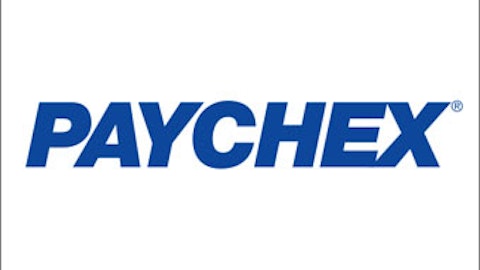Paychex, Inc. (NASDAQ:PAYX) has paid uninterrupted dividends since going public in 1988. While the company held its dividend flat during the financial crisis, it has otherwise increased its dividend every year since the mid-1990s and currently yields 3.5%.

PAYX has a very durable business model that throws off predictable free cash flow. We believe its dividend is very safe and offers at least average growth prospects, making it a good fit for our Conservative Retirees dividend portfolio.
PAYX is not a very popular stock among smart money investors. Just 22 funds out of some 730 tracked by Insider Monkey hold shares of the company as of the end of September, compared to 31 funds a quarter earlier. However, during the third quarter, the aggregate value of stakes held by the funds from the Insider Monkeyd database went up to $485.27 million from $361.85 million and represented roughly 2.80% of PAYX at the end of September. Robert Joseph Caruso’s Select Equity Group holds 4.98 million shares of PAYX, according to its latest 13F filing.
Let’s take a closer look at the business.
Business Overview
PAYX was founded in 1971 and provides a range of payroll, human resource, and benefits outsourcing services to over 590,000 small and medium-sized businesses. It offers a wide range of services including payroll processing (e.g. calculate, prepare, and delivery employee payroll checks; prepare payroll tax returns; collect and remit client’s payroll obligations, etc.), retirement services (e.g. 401(k) plan design, recordkeeping, and plan management services), insurance (e.g. group health insurance, health care reform, workers’ comp, etc.), and a fully outsourced human resource solution (e.g. on-site personnel, employee handbooks, etc.). Essentially, PAYX helps businesses outsource non-core administrative services in a cost-effective manner so they can focus on their strengths.
Approximately 61% of PAYX’s revenue is derived from payroll services (includes a growing portfolio of standalone services – expense management, applicant tracking, time & labor), with the remaining 39% from human resource services (e.g. retirement, insurance, human resources).
Business Analysis
The services PAYX provides to businesses are mission-critical – payroll taxes must be correctly calculated and paid on time; insurance policies must conform with health care reform; proper records must be kept for 401(k) plans; and more.
As a small business owner, you want these jobs done correctly and efficiently. These aren’t tasks you want to lose any sleep or energy over. With fewer resources compared to larger companies, outsourcing these administrative tasks, which are constantly evolving as government regulations change, is usually more efficient.
With 50+ years of operating history, a large direct sales force, numerous indirect sales channels (50% of new core payroll clients are referred by existing clients, CPAs, and banks), and substantial market share, PAYX is the trusted brand of choice.
PAYX has dominant market share positions in its key businesses. The company is #1 and #2 in payroll services for small and medium-sized businesses, respectively (PAYX pays one in every 15 private sector workers in the U.S.); #1 in retirement services recordkeeping (as measured by number of plans); #23 in insurance services with more than 140,000 H&R covered lives; and provides HR services to more than 31,000 clients with over 858,000 worksite employees.
As long as customers’ administrative needs are being met with quality service at a reasonable price, they have few reasons to switch vendors. Their employees also become familiar with PAYX’s software (about 90% of PAYX’s mobile app usage comes from its clients’ employees who are doing things such as accessing their check stubs and W-2s), raising switching costs. As a result, PAYX’s client retention rate reached a new record high (82%) during its most recent fiscal year.
PAYX has also evolved to offer clients a larger scope of services compared to many smaller competitors. Going back just 10 years, PAYX’s business was 100% payroll services. However, the company now offers an array of human resource services (39% of revenue), which leverage the information gathered in PAYX’s base payroll processing service. Human resource services competitors that lack payroll services must depend on vendors like PAYX to power their solutions, putting them at a disadvantage.
PAYX’s broad product portfolio offers simplification and convenience for customers, but it also helps lower their costs in some cases. For example, PAYX can pool together its customers to increase their purchasing power for insurance products.
With no debt and over $900 million in cash on the balance sheet, PAYX can also acquire products to fill gaps, maintain the most fully integrated technology and service available in the marketplace, remain entrenched with its customers, and expand its growth opportunities. For example, PAYX recently acquired Advance Partners, which serves the temporary staffing industry. PAYX previously had no exposure to this market but can now access the 3 million employees it has.
Finally, it’s worth mentioning that PAYX also earns interest income from investing client funds collected but not yet remitted to applicable tax ore regulatory agencies or to client employees. PAYX is a safe dividend stock that would also see some benefit if rates ever rise.
Despite the scale, regulatory expertise, service breadth, switching costs, and brand advantages enjoyed by PAYX, this is still a fragmented marketplace with fairly low barriers to entry.
Follow Paychex Inc (NASDAQ:PAYX)
Follow Paychex Inc (NASDAQ:PAYX)
Receive real-time insider trading and news alerts




